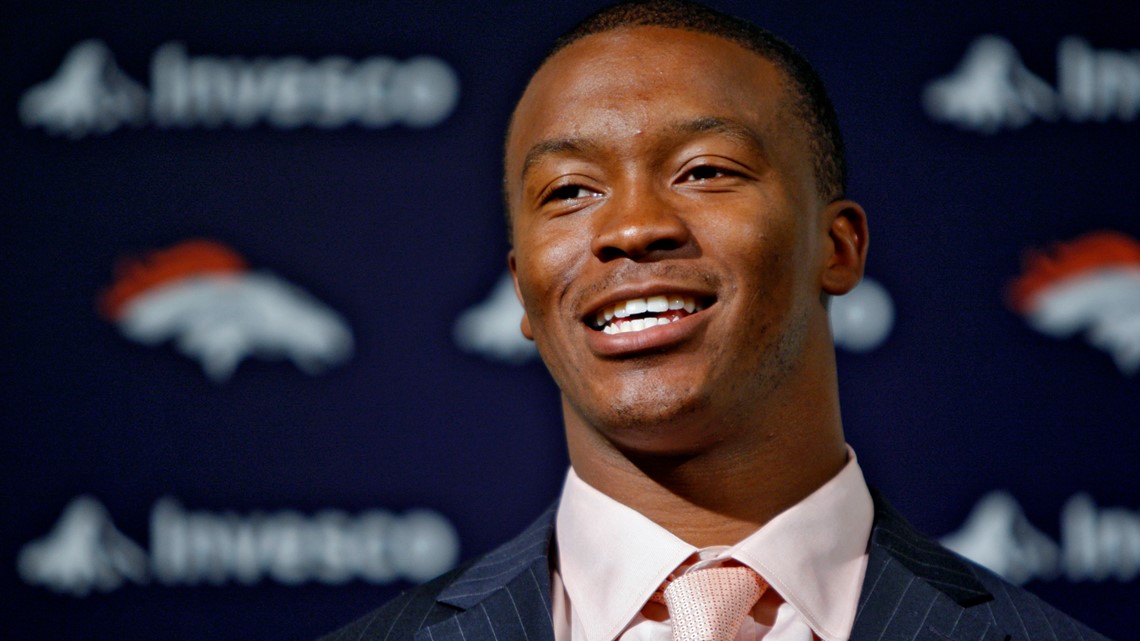DENVER — Katina Smith was somewhat overwhelmed Tuesday morning.
The magnitude of the Concussion Legacy Foundation of Boston University releasing the diagnosis that her son Demaryius Thomas had Stage 2 chronic traumatic encephalophathy, more commonly known as CTE, caught her offguard.
"I knew about the report and knew it was coming out but I didn't know they would announce it on (Good Morning America and the New York Times) when they did this morning.'' Smith said in an interview with 9News. "It's rekindled so many emotions."
Thomas, a star receiver for the Broncos from 2010 until he was traded to Houston halfway through the 2018 season, was 33 when he died Dec. 9 of last year after he was found unconscious in the bathroom of his Georgia home.
Smith's reaction to her son having Stage 2 CTE?
"It brought a small piece of relief but I wasn't surprised,'' Smith said. "And then as it started to set in I became angry. Angry, frustrated, disappointed. Because football was a game my son loved with everything he had but it also had something to do with his demise.
"I have a nephew who was going to play football at GMC (Georgia Military College) but he quit because of what his uncle went through."
Demaryius Thomas' family released the findings of his brain study through the Concussion Legacy Foundation (CLF), which arranged the brain donation, to help raise awareness of CTE and encourage the football community to support research.
“They first reached out to his father (Bobby Thomas) to see if he wanted to do this (donate his brain to science) because they had his contact information,'' Katina Smith said. "His father then asked me if we wanted to do this and at first I was still grieving and I said, 'no.' And Bobby said, 'Well, maybe if you talk to the people they can explain it to you and then we can talk about it again.'
"I did talk to Boston University and they informed me of what the process entailed. But what really made me go along with it was the more I thought about it, Demaryius had told me that if anything happened to him, he wanted to make sure he left something to help others. It was very important for my son to do what he could for others. So that's why I agreed to go through it.''
RELATED: 'I will always love Bay Bay': Family and friends remember former Broncos star, Demaryius Thomas
Researchers pointed out that while Thomas had a form of CTE, he most likely died as the result post-traumatic epilepsy. Thomas began experiencing seizures a year after a motor vehicle accident in 2019 and later a fall. Smith said her son had been been been prescribed medicine for his seizures but "he used a more holistic approach because he didn't think the medicine was working."
The Fulton County Medical Eximaner has yet to complete its autopsy on Thomas. Smith said she has been told the Medical Examiner's office has been backed up because of the COVID impact and also because it was awaiting his brain study results from Boston University.
Stage 2 CTE is associated with progressive behavior, cognitive and mood abnormalities. In the years before he died, Thomas developed depression, anxiety, panic attacks, and trouble with his memory, according to the Concussion Legacy Foundation press release.
Stage 4 is the most severe stage of CTE and is usually associated with dementia.


"Like so many that have gone before, we found stage 2 CTE in the brain of Demaryius Thomas. The question I keep asking myself is 'When will enough be enough?' When will athletes, parents and the public at large stop ignoring the risks of American football and insist that the game be changed to reduce subconcussive hits?” said Dr. Ann McKee, chief of neuropathology for the VA Boston Healthcare System and director of the BU CTE Center and VA-BU-CLF/UNITE Brain Bank.
It was CFL CEO and co-founder Dr. Chris Nowinski who reached out to the Thomas family to propose the CTE study.
Thomas played 10 seasons in the NFL for the Denver Broncos, New York Jets, and Houston Texans, making four Pro Bowl rosters, and winning Super Bowl 50 with the Denver Broncos.
Thomas was the 22nd pick in the first round of the 2010 draft out of Georgia Tech, and in all played 16 years of tackle football before announcing his retirement at age 33 in 2021, six months before his death.
In the five-season period from 2012-16 with the Broncos, Thomas averaged an astonishing 98 catches for 1,374 yards and 9 touchdowns. He is certain to be elected into the Broncos' Ring of Fame when he becomes eligible in 2025.
The New York Times referred to a hit Thomas received from Carolina Panthers' star linebacker Luke Kuechly during the Broncos' Super Bowl 50 victory. Thomas had just one catch in that game after he had set a Super Bowl record two years earlier with 13 catches when the Broncos were clobbered by the Seattle Seahawks.
"He had such a bad headache after that hit in Super Bowl 50 that he had to cut his celebration short,'' Smith said. "But what really started it for him was the hit he took in Super Bowl 48 from No. 31 (Kam Chancellor). After that hit from Kam Chancellor, Demaryius was constantly working on his body because of pain he had in his hip and neck.
"And really it all started in a game in 2011 against Minnesota. His hip had been bothering him ever since that game,'' Smith said.
Thomas caught four passes from Tim Tebow for 144 yards and two touchdowns, all in the second half, in the Broncos' comeback win against the Vikings.
Since the death of her son, Smith has been further traumatized by the robbery of thousands of dollars worth of football memorabilia, guns, cash and other items from Thomas' Roswell, Ga., home after he died.
Former Bibbs County Sheriff's Deputy Timothy Vashon Jones was arrested on a charge of criminal trespass but released the next day. Smith said that while Thomas' ESPY award has been retrieved, other items are still missing and she has been frustrated that justice has not yet been served.
Thomas is one of more than 300 former NFL players who have been diagnosed with CTE by McKee and the BU CTE Center research team.
Former and current NFL players and their families worried about possible CTE symptoms can reach out to the Concussion Legacy Foundation Help Line for support at CLFHelpline.org.
SUGGESTED VIDEOS: Sports

